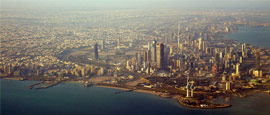Kuwait City History
The 'black gold' (oil), which was discovered in Kuwait early in the 20th century, has been the secret of Kuwait City's dramatic transformation from modest pearling town to thriving, international business hub. Now dominated by glittering steel and glass towers, the earliest inhabitants arrived to find little more than a beach and a stretch of scrubland when they arrived in 1613.
When the Bani Utubs people arrived in 1716, they took over what had existed as little more than a sleepy fishing village, and turned it into a hub for trade coming from India and the Far East. By 1750, Kuwait had become an essential stop on the trade route from Calcutta and Muscat to Baghdad, Aleppo and beyond.
The success of the Bani Utubs had turned Kuwait into a tempting hub and in 1775, Iraqi merchants fleeing Basra, then besieged by the Persians, added to its trading prowess. The British East India Company followed, making Kuwait a key stop on their trading routes, helping grow its wealth.
By the 1800s, Kuwait had become so rich, it was being spoken of as ‘the Marseilles of the East’ - a reputation and a reality that continued well into the early years of the 20th century. Although the Great Depression and the two World Wars reduced trade, the wealthiest families, among them the Al-Ghanim and Al-Hamad, remained among the world’s richest families well into the 1950s.
Oil was discovered around this time, giving the city’s economy yet another boost and leading to what locals describe as a ‘golden era’ for Kuwait. But with the 1990s came economic turmoil courtesy of plummeting oil prices and recession, while the Iraqi invasion in 1990 left much of the city in ruins.
In March 2003, a now-rebuilt Kuwait became the springboard for the Anglo-American invasion of Iraq. The city was also the scene of Arab Spring-inspired protests in 2012. Nevertheless, Kuwait is well and truly back on its feet and open for business once again.
Did you know?
• Kuwait was a protectorate of Great Britain from 1899 to 1961.
• Full political rights were granted to Kuwaiti women in 2005.
• Kuwait’s Failaka Island was an ancient trading post, with evidence of settlement dating to the third millennium BC.
Do you have any Feedback about this page?
© 2025 Columbus Travel Media Ltd. All rights reserved. No part of this site may be reproduced without our written permission, click here for information on Columbus Content Solutions.




 You know where
You know where